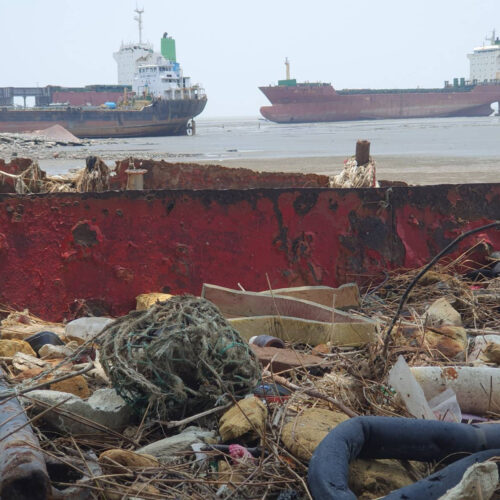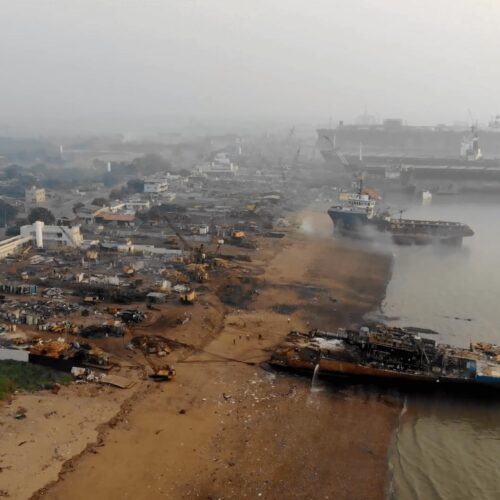Press Release – The EU agrees: the recycling of ships is a matter of global environmental justice
The Basel Convention's ban on the export of toxic ships to developing countries reestablished
In its proposal for a new regulation on waste shipments published last week, the European Commission surprised many observers by rejecting their earlier romance with the Hong Kong Convention and return to the Basel Convention's affirmation that the Global South should not become the world's dumping ground for hazardous wastes, even when those wastes are ships.
In 2013, EU-flagged vessels were removed from the scope of the waste shipment rules by way of the EU Ship Recycling Regulation, which aimed to ignore the Basel Convention in favor of following the Hong Kong Convention. To date, the Hong Kong Convention, crafted in 2009 under the auspices of the International Maritime Organization, is still not in force. Meanwhile, the Basel Convention's "Basel Ban", designed with a pointed intent to protect developing countries from exploitation, did enter in force as new Convention Article 4a on 5 December 2019.
The EU Waste Shipment Regulation proposal now states that EU-flagged vessels intended to be scrapped whilst under EU jurisdiction are no longer exempted from EU waste laws and need to comply the with Article 4a; this makes it illegal to export any form of hazardous waste from OECD to non-OECD countries for any reason. In a report published in September 2020, bolstered by a legal analysis by the Center for International Environmental Law (CIEL), the NGOs European Environmental Bureau, Basel Action Network, Greenpeace and the NGO Shipbreaking Platform had urged the EU to realign its legislation to respect its international legal commitments under the Basel Convention, including the Ban.

Unfortunately though, while this is seen as a significant signal, very little of the world's fleet of ships, including those flying EU flags, are going to be caught in an EU port when they declare they are to be recycled. It remains all too easy for ship owners to wait to make the fateful scrap announcement in the ports of non-OECD countries or even on the high seas, and thus legally avoid the Basel Ban. The Hong Kong Convention governs flag states, but flags are easily changed; further, the Hong Kong Convention does not have any trade restrictions to prevent the Global South from being disproportionately burdened with the world's most hazardous and difficult-to-recycle wastes.
Meanwhile, 30% of the tonnage broken down on the infamous shipbreaking beaches of India, Bangladesh and Pakistan, harming human health and the environment, is owned by EU-domiciled shipping companies. Thus it is that NGOs are seeking legislative reforms that place legal jurisdiction over exports defined not only by port states, and flags states, but by the countries that are the corporate domicile of ship owners as well.

According to the environmental and human rights groups, new thinking on how to hold shipping companies accountable for the proper management of their end-of-life ships is aligned with emerging European policies. The European Green Deal calls on the EU to manage its own waste and encourage a circular economy by building a robust and dynamic market for secondary materials, and one that avoids the blatant cost externalisation made possible via exports to weaker economies.

CONTACTS
Ingvild Jenssen, NGO Shipbreaking Platform, ingvild@shipbreakingplatform.org, +32 260 94 419.
Jim Puckett, Basel Action Network, jpuckett@ban.org, +1 206 652 5555.
Related news

Press Release – Platform publishes list of ships dismantled worldwide in 2024
409 ships were dismantled globally in 2024, of which 255 ended up in South Asian yards. Bangladesh remains the shipping industry’s first choice for scrapping, despite grave consequences for workers, local communities and fragile coastal ecosystems.
... Read More
Press Release – Seatrade reaches settlement with Dutch Public Prosecution Service
Dutch ship owner Seatrade has reached a settlement with the Dutch Public Prosecution Service following the illegal export of four ships to India, Bangladesh, and Turkey for… Read More

Platform News – Global ban on exporting hazardous waste to developing countries becomes law
The Basel Ban Amendment, adopted by the Parties to the Basel Convention in 1995, became international law on December 5.
... Read More
Press Release – Another worker dies at Alang shipbreaking yard
Just weeks before the Hong Kong Convention (HKC) for the Safe and Environmentally Sound Recycling of Ships is set to enter into force on 26 June,… Read More

Platform News – NGO Shipbreaking Platform presents Impact Report 2018/2019
These past two years the Platform has won support for sustainable ship recycling in the financial sector while raising the stakes for ship owners who opt for… Read More

Platform News – Investigations ongoing after Norwegian authorities press charges against owners of Harrier
The HARRIER is still under arrest in Norway after its owners failed to illegally set sail for the dangerous and dirty scrapping yards in Gadani, Pakistan, last… Read More

Press Release – NGOs respond to legal threats by shipbreaking industry and withdraw from industry conference
On Monday, the NGO Shipbreaking Platform, an international coalition of labour, human rights and environmental organisations, withdrew their participation from the TradeWinds Ship Recycling Forum that starts… Read More

